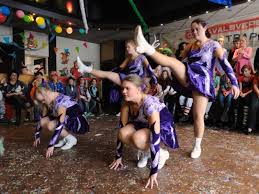Never heard about? Quit possible. The word don’t exist (yet) in English.
It could be translated to majorette, but in our countries that’s a complete different discipline. Dance marietties don’t use a baton (stick). It’s more like cheerleading, but they don’t perform at sports, they act at competitions, festivals, carnival…
 Dance marietties are girls marching in a nice uniform dancing during carnival, celebrations and parades. Dance marietties and carnival are inseparable, like smoke and fire. The cheerleaders of the Carnival are dancing graceful to acrobatic figures. Their synchronous movements fit any carnival music.
Dance marietties are girls marching in a nice uniform dancing during carnival, celebrations and parades. Dance marietties and carnival are inseparable, like smoke and fire. The cheerleaders of the Carnival are dancing graceful to acrobatic figures. Their synchronous movements fit any carnival music.
Dancing on fast polka music is called garde, to contemporary music is simply called show (dance).
Many groups are members of FEN Flanders (European Federation of Fools).
The ‘Dance Marieke’ probably dates from France. At the end of the 18th - early 19th century young ladies accompanied French soldiers by their many field trips in France and Germany. These lascivious girls were called “camp followers". They washed and danced for the soldiers and offered additional services. In return, the army gave sustenance and protection.
Halfway through the 19th century arose the custom of carnival to fool with the pompous army officers and their spruced up ladies, especially in the Rhineland and around Cologne. The 'princes' imaged ridiculously the officers, and made of the military salute the current 'Alaaf’. The dancing ladies were then baptized 'Dance Marieke'.
(A cantine girl (also sutler star) was a washing chick from an army unit, often married to a soldier below the rank of petty officer. They also took care of catering. They were also given a uniform that matched the corps.)
Dance marietties and Majorettes
A "Dance Marieke" is not a Majorette. Those make with their majorette stick all kinds of figures. Dance marietties show solo, in pairs or in groups and show individual or group definite movements, figures and steps adapt to the rhythm of a march or polka.
This dance form deserves the name of sport and requires good fitness and training. At a young age (around 6 years) training can begin. After two years, candidates may call themselves "Dance Marieke”.'
Rush hour for Dance marietties is obviously the carnival season from 11 November to the carnival. Parades, festivals and performances urge for a busy schedule. After the carnival crowd the dancing girls take part in tournaments, both regionally and internationally.
They belong to a board of eleven or a prince whisk. Their task: action in the different sessions.
